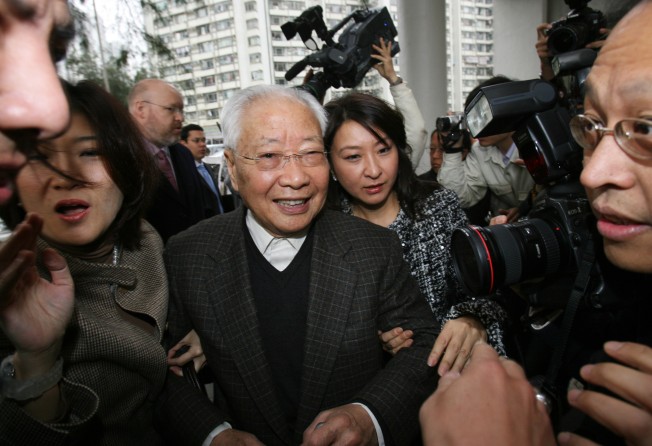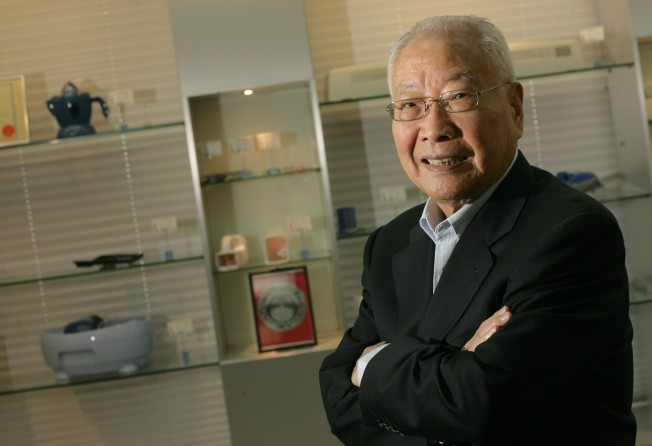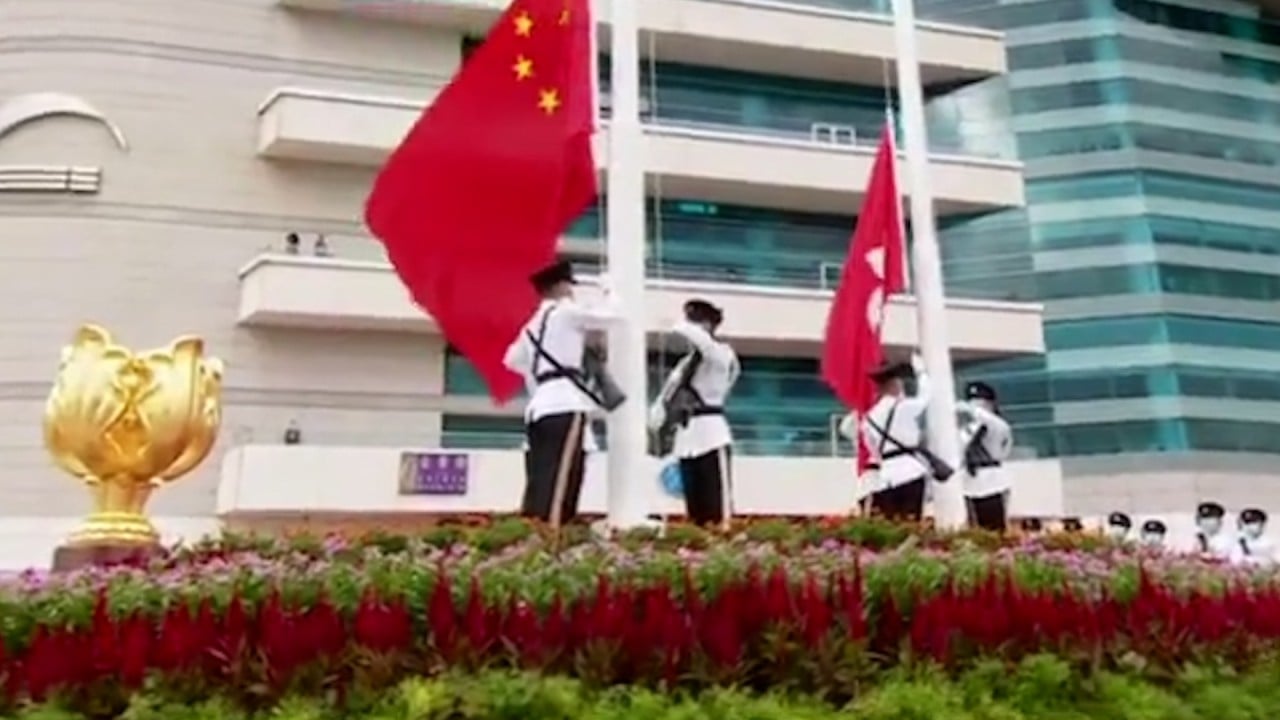
Chiang Chen, Hong Kong industrialist and philanthropist who changed the world of plastic mouldings, dies at 98
- The founder of Chen Hsong Holdings rose to wealth and fame with a plastic blow-moulding machine that could handle two colours, a crucial industry turning point
- The industrialist also became known for his philanthropy through the Chiang Chen Industrial Charity Foundation and his inspirational rags-to-riches story

Hong Kong businessman Chiang Chen, a well-known industrialist and philanthropist, passed away at the age of 98 in the company of family members on March 13.
Chiang, the founder of Hong Kong-listed Chen Hsong Holdings, will be remembered as the city’s “trailblazing philanthropic industrialist as well as a true master in industrial machinery”, the company said in a March 14 statement.
Hong Kong Chief Executive Carrie Lam Cheng Yuet-ngor expressed her deep condolences on the passing of Chiang.
“Dr Chiang was a pioneer in the industrial development of Hong Kong, with distinguished achievements made in the machinery and industrial arena, and a leading role assumed in the trade. He made remarkable contributions to the economic development of Hong Kong and was one of the first patriotic businessmen to invest and set up businesses in the mainland after the country’s reform and opening up,” Lam said in the statement.
“A philanthropist and also an educator, he established a charity foundation in the earlier years to foster talent training and industrial research, nurturing tens of thousands of experts in industrial technology and management for the nation.”
For many, Chiang’s life story has served as an inspirational rags-to-riches tale. He grew up as an orphan from a poor Chinese farming family, later developing a business acumen that would raise him to prominence as a wealthy industrialist.
Born in Heze, in eastern Shandong province, in 1923, Chiang came of age in a war-torn China, immigrating to Hong Kong in 1949, the year the Chinese Civil War ended.
Nearly 10 years later, he had set up Chen Hsong Machinery Shop, the predecessor of Chen Hsong Group, with a friend. The group listed on the Hong Kong stock exchange under the name Chen Hsong Holdings in 1991 as one of the world’s leading manufacturers of plastic injection moulding machines.
Chiang was among the first group of industrialists to invest in mainland China, establishing a joint-venture factory for plastic injection moulding machines in Shunde, Guangdong province, in 1986, after the country opened up its economy.
In 1990, Chiang made a decision that made him notably different from most other businessmen at the time. He chose to donate his entire Chen Hsong holdings – valued at the time at HK$800 million (US$102 million) – to the Chiang Chen Industrial Charity Foundation (CCICF). He established the foundation to nurture industrial development in Greater China through scholarships, training and research funding.
To date, more than HK$400 million has been given to the CCICF, which is now one of the largest charity organisations based in Hong Kong dedicated to the education and development of Chinese industrial manufacturing talent, according to Chen Hsong.

In a 2001 interview with the South China Morning Post, Chiang said his “dream” is to give away his family fortune.
“I always wanted to be a kung fu hero who, in classical Chinese literature, was willing to give up his life and wealth to help his country and people,” the philanthropist said.
“I did not have any money and the ability to help China when I was a young boy because my family was very poor. But I had the money when I was 68, and so I did what I always wanted to do.”
Chiang’s mother died when he was 2 years old, and his father left him an orphan when he was 10. Chiang was raised by an elder brother.
During Japan’s eight-year occupation of China, which ended in 1945, the Chiang brothers were constantly fleeing from one city to another, which continued through the civil war. The pair arrived in Hong Kong after the communist takeover of the mainland.
“Life in wartime was so harsh that I have never felt bitter about difficult times in the later part of my life,” he said.
Chiang picked up his early engineering knowledge during a five-year stint in the Kuomintang army, which he joined at the age of 14. Once in Hong Kong, he took on a variety of jobs – working as a labourer, dockside courier and in a Ma On Shan quarry.
With an introduction from his landlord in 1956, he joined Hong Kong Aircraft Engineering Co (Haeco), Swire Group’s aircraft maintenance and repair arm, where he further honed his engineering skills.
Looking back, Chiang said his HK$200 monthly salary was “not too bad” in the early 1950s, when fried noodles cost about 60 HK cents and a bowl of congee about 10 HK cents. He left Haeco for a higher-paying job, but the company collapsed not long after he joined. Despite an invitation from his former boss to return to Haeco, he was too embarrassed to go back.
Instead, he used his HK$200 savings to establish Chen Hsong in 1958. The firm’s name was derived from his own and that of his founding partner, Tam Hsong. Tam withdrew from the company a few years later.
As a do-anything engineering start-up, the firm’s two employees grabbed work wherever they could, whether it was fixing a broken engine or designing a new production machine.
A crucial turning point was a client asking Chiang to design a plastic blow-moulding machine that could handle two colours, an improvement over the standard single-colour machines at time. The client paid a princely HK$6,000 for the innovative machine, ensuring the firm’s financial success and, within the plastics industry, a measure of fame.
The machine made a silk, red-and-white striped ball – a simple but hugely successful toy with local children in the 1960s. That earned him fame as the “king of plastic injection moulding machines”.
From there, the firm grew into one of the world’s biggest makers of plastic injection moulding machines, with 2,300 employees. The machines are sold to manufacturers in Hong Kong, mainland China, and Taiwan, among other global markets.
Last year, Chen Hsong reported a 117 per cent year-on-year rise in net profit to HK$203 million, with total assets up 27 per cent to HK$4.38 billion.
In the 1990s, Chiang was appointed to advise the Chinese government on Hong Kong affairs in the run-up to the former British colony’s reunification with the mainland in 1997. In 2005, he was awarded the Hong Kong government’s top honour, the Grand Bauhinia Medal, for his industrial and charity work. He stepped down as chairman in April 2018, becoming honorary chairman following his retirement.
Chiang is survived by his wife, six daughters, a son, and his grandchildren.
His most well-known children are his second daughter Ann Chiang Lai-wan, a former pro-establishment lawmaker; third daughter Agnes Chiang Lai-ping, a famed singer in the 1980s; fourth daughter Lily Chiang Lai-lei, the first woman to chair the city’s General Chamber of Commerce; and sixth daughter Chiang Lai-yuen, who managed her father’s business as Chen Hsong’s chairman and chief executive.
Chen Hsong shares closed up 0.48 per cent to HK$2.10 on Tuesday.
